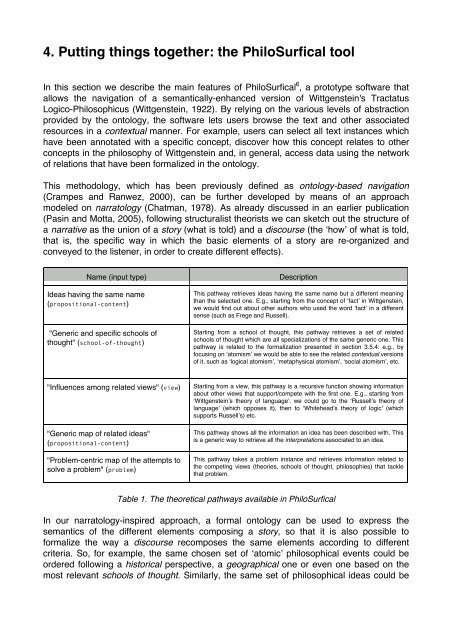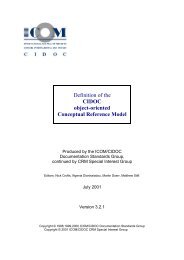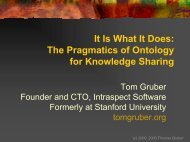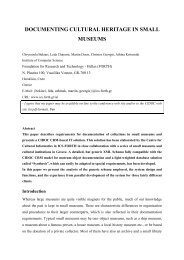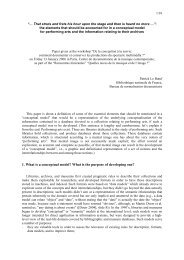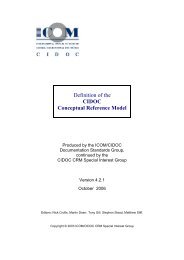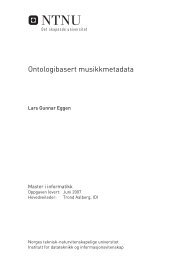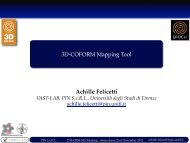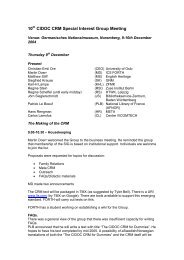Ontological Requirements for Annotation and ... - The CIDOC CRM
Ontological Requirements for Annotation and ... - The CIDOC CRM
Ontological Requirements for Annotation and ... - The CIDOC CRM
Create successful ePaper yourself
Turn your PDF publications into a flip-book with our unique Google optimized e-Paper software.
4. Putting things together: the PhiloSurfical toolIn this section we describe the main features of PhiloSurfical 6 , a prototype software thatallows the navigation of a semantically-enhanced version of Wittgenstein's TractatusLogico-Philosophicus (Wittgenstein, 1922). By relying on the various levels of abstractionprovided by the ontology, the software lets users browse the text <strong>and</strong> other associatedresources in a contextual manner. For example, users can select all text instances whichhave been annotated with a specific concept, discover how this concept relates to otherconcepts in the philosophy of Wittgenstein <strong>and</strong>, in general, access data using the networkof relations that have been <strong>for</strong>malized in the ontology.This methodology, which has been previously defined as ontology-based navigation(Crampes <strong>and</strong> Ranwez, 2000), can be further developed by means of an approachmodeled on narratology (Chatman, 1978). As already discussed in an earlier publication(Pasin <strong>and</strong> Motta, 2005), following structuralist theorists we can sketch out the structure ofa narrative as the union of a story (what is told) <strong>and</strong> a discourse (the ʻhowʼ of what is told,that is, the specific way in which the basic elements of a story are re-organized <strong>and</strong>conveyed to the listener, in order to create different effects).Name (input type)Ideas having the same name(propositional-content)"Generic <strong>and</strong> specific schools ofthought" (school-of-thought)DescriptionThis pathway retrieves ideas having the same name but a different meaningthan the selected one. E.g., starting from the concept of ʻfactʼ in Wittgenstein,we would find out about other authors who used the word ʻfactʼ in a differentsense (such as Frege <strong>and</strong> Russell).Starting from a school of thought, this pathway retrieves a set of relatedschools of thought which are all specializations of the same generic one. Thispathway is related to the <strong>for</strong>malization presented in section 3.5.4: e.g., byfocusing on ʻatomismʼ we would be able to see the related contextual versionsof it, such as ʻlogical atomismʼ, ʻmetaphysical atomismʼ, ʻsocial atomismʼ, etc."Influences among related views" (view)"Generic map of related ideas"(propositional-content)"Problem-centric map of the attempts tosolve a problem" (problem)Starting from a view, this pathway is a recursive function showing in<strong>for</strong>mationabout other views that support/compete with the first one. E.g., starting fromʻWittgensteinʼs theory of languageʼ, we could go to the ʻRussellʼs theory oflanguageʼ (which opposes it), then to ʻWhiteheadʼs theory of logicʼ (whichsupports Russellʼs) etc.This pathway shows all the in<strong>for</strong>mation an idea has been described with. Thisis a generic way to retrieve all the interpretations associated to an idea.This pathway takes a problem instance <strong>and</strong> retrieves in<strong>for</strong>mation related tothe competing views (theories, schools of thought, philosophies) that tacklethat problem.Table 1. <strong>The</strong> theoretical pathways available in PhiloSurficalIn our narratology-inspired approach, a <strong>for</strong>mal ontology can be used to express thesemantics of the different elements composing a story, so that it is also possible to<strong>for</strong>malize the way a discourse recomposes the same elements according to differentcriteria. So, <strong>for</strong> example, the same chosen set of ʻatomicʼ philosophical events could beordered following a historical perspective, a geographical one or even one based on themost relevant schools of thought. Similarly, the same set of philosophical ideas could be


